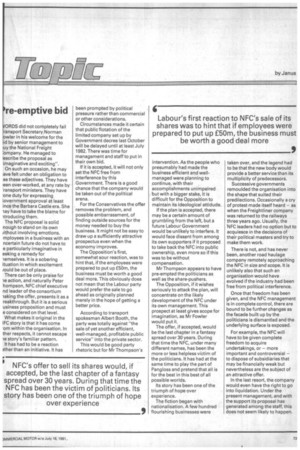re-em ptive bid
Page 47

If you've noticed an error in this article please click here to report it so we can fix it.
ORDS did not completely fail ransport Secretary Norman owler in his welcome for the id by senior management to iuy the National Freight :ompany. He managed to escribe the proposal as imaginative and exciting". On such an occasion, he may ave felt under an obligation to se these adjectives. They have ,een over-worked, at any rate by .ransport ministers. They have one duty for expressing iovernment approval at least ince the Barbara Castle era. She lay have to take the blame for itroducing them.
The NFC proposal is solid nough to stand on its own iithout involving emotions. mployees in a business with an ncertain future do not have to e particularly imaginative in eeking a remedy for lemselves. It is a sobering ituation in which excitement rould be out of place.
There can be only praise for le action, and naturally Peter hompson, NEC chief executive nd leader of the consortium laking the offer, presents it as a reakthrough. But it is a serious usiness proposition and must e considered on that level. What makes it original in the IFC story is that it has come .om within the organisation. In ther respects, it cannot escape
le story's familiar pattern. . It has had to be a reaction lther than an initiative. It has been prompted by political pressure rather than commercial or other considerations.
Circumstances made it certain that public flotation of the limited company set up by Government decree last October will be delayed until at least July 1982. There was time for management and staff to put in their own bid.
If it is accepted, it will not only set the NFC free from .interference by this
Government. There is a good chance that the company would be taken out of the political arena.
For the Conservatives the offer removes the problem, and possible embarrassment, of finding outside sources for the money needed to buy the business. It might not be easy to draw up a sufficiently attractive prospectus even when the economy improves.
The Opposition's first, somewhat sour reaction, was to hint that, if the employees were prepared to put up £50m, the business must be worth a good deal more. This obviously does not mean that the Labour party would prefer the sale to go ahead as originally planned merely in the hope of getting a better price.
According to transport spokesman Albert Booth, the party was totally against "the sale of yet another efficient, well-managed, profitable public service" into the private sector.
This would be good party rhetoric but for Mr Thompson's intervention. As the people who presumably had made the business efficient and wellmanaged were planning to continue, with their accomplishments unimpaired but with a bigger stake, it is difficult for the Opposition to maintain its ideological attidude.
If the plan is accepted, there may be a certain amount of grumbling from the left, but a future Labour Government would be unlikely to interfere. It would face dissent from among its own supporters if it proposed to take back the NFC into public ownership, even more so if this waste be without compensation.
Mr Thompson appears to have pre-empted the politicians as well as the share-pushers.
The Opposition, if it wishes seriously to attack the plan, will concentrate on the likely development of the NFC under its own management. This prospect at least gives scope for imagination, as Mr Fowler would put it.
The offer, if accepted, would be the last chapter in a fantasy spread over 30 years. During that time the NFC, under many different names, has been the more or less helpless victim of the politicians. It has had at the same time to play the part of Pangloss and pretend that all is for the best in this best of all possible worlds.
Its story has been one of the triumph of hope over experience.
The fiction began with nationalisation. A few hundred flourishing businesses were taken over, and the legend had to be that the new body would provide a better service than its multiplicity of predecessors.
Successive governments remoulded the organisation into the shape that suited their predilections. Occasionally a cry of protest made itself heard — as when the Freightliner company was returned to the railways three years ago. Usually, the NFC leaders had no option but to acquiesce in the decisions of their political masters and try to make them work.
There is not, and has never been, another road haulage company remotely approaching the NFC in size and scope. It is unlikely also that such an organisation would have evolved if the industry had been free from political interference.
Once that freedom has been given, and the NFC management is in complete control, there are bound to be further changes as the facade built up by the politicians is dismantled and the underlying surface is exposed.
For example, the NFC will have to be given complete freedom to acquire undertakings, or — more important and controversial — to dispose of subsidiaries that may be financially weak but nevertheless are the subject of an attractive offer.
In the last resort, the company would even have the right to go into liquidation. Under the present management, and with the support its proposal has generated among the staff, this does not seem likely to happen.




















































